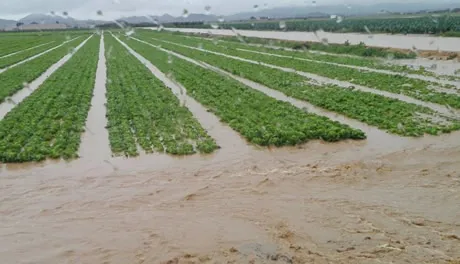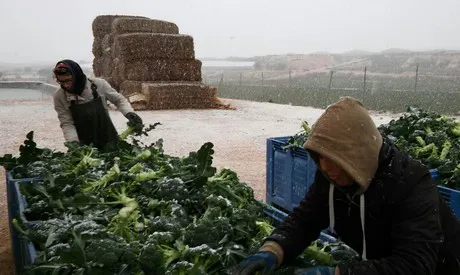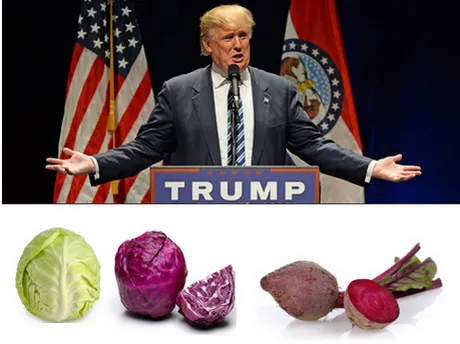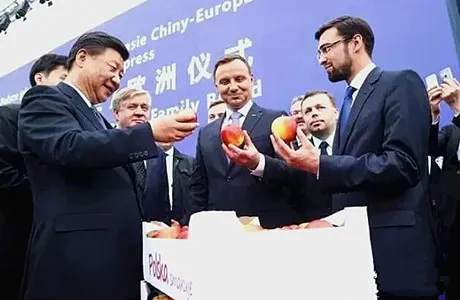Heavy rains in Spain during December continuing into the new year, followed by snow during January in Italy, caused major supply problems in Europe at the beginning of 2017. Spanish producers reported that vegetable fields had been flooded from Cartagena to Murcia, with supply problems in the South of Spain affecting
lettuce, endive and spinach supplies.
Iceberg lettuce was hit hardest, along with
courgettes, tomatoes, capsicums, and baby leaf and lettuce mixes. Across Europe there were empty shelves in the vegetable isles, Wilf Whittle from Sharrocks Fresh Produce said that there were people who have been in the industry for 40-50 years who have
never seen anything like this before. "These days we have all the knowledge and technology at hand, but we just can't beat the weather."
The iceberg shortage was so extreme, that some European traders started sourcing from North America to fill the gap and
looked to Morocco and Tunisia after circumstances made it more difficult for the Turkish supply of other veggies.
Not just the open field vegetables were affected, but greenhouse producers also reported that
heating costs were also skyrocketing. Many supporting structures, nets and covers have been damaged due to the weight of the snow. "Nobody expected a situation like this, some greenhouses have collapsed. Our kiwi orchard has collapsed due to the weight of the snow."
End to the drought in South Africa
After a long period of drought in South Africa the rain returned in January. It was great news for the growers in the north east, especially the citrus growers as things were getting to a critical stage. Unfortunately, what was
great news for one, was not necessarily good for the other. The rain also hit the Orange River, threatening the grape production while it was in full production.
Trump sworn in as 45th American President
Trump was sworn in as the 45th President on the 20th of January, which had many wondering what affect this new President would have on the industry worldwide.
Dutch trader Jos Koedooder said he was
anxiously awaiting Donald Trump’s inauguration as president of the US on 20 January. “We are actually all waiting for this man. Stop fighting with Russia, and things will be better. Politics is going to play its part in the coming time. When Russia enters the market again, we will see a complete change in the way we trade.”
With the United States being the top global agricultural exporter, industry groups that lobby on behalf of fruit growers were focusing on the Trump administration's stance and plans to deal with various trade deals he campaigned against on the trail, especially with his
firm stance against trade deals such as NAFTA and TPP.
Just before his inauguration, Trump
increased clearance procedure for Chinese pears. In the past, goods only needed 3-5 days to pass customs; nowadays, the time for clearance in Los Angeles is about 10 days, and in New York it can be up to a fortnight.
At the end of the month, there was some hope that
warming relations between President Trump and Vladimir Putin, might be the first step to lifting the ban against Russia.
“In the course of the conversation, both sides demonstrated a desire for active joint efforts to stabilize and develop Russia-American relations on a constructive, equitable and mutually beneficial basis,” the Kremlin said. “The importance was underlined of restoring mutually beneficial trade and economic ties between business on both sides.”
All eyes on China
China was the talk of the new year, as many countries around the world, who were not the already one of the 39 countries holding permits to
export fresh fruits to China, were looking to enter this promising market.
With Chinese New Year rapidly approaching, exporters around the world were already shipping their fruit to the Asian markets before the festivities begin. It is the tradition to give big sweet red fruits to friends and family at this time of the year and cherries make the perfect gift. Along with giving a lot of opportunities for exporters and increasing popularity of foreign imports, the holiday also gives
counterfeiters many opportunities, something which Australian was trying to fight last January with special QR codes.
Polish apple exporters were full of hope at the beginning of 2017, after the first container of sea-transported
Polish Gala Must apples reached China. This was the same apple variety given by the Polish premier to Chairman Xi Jinping when he visited Poland.










